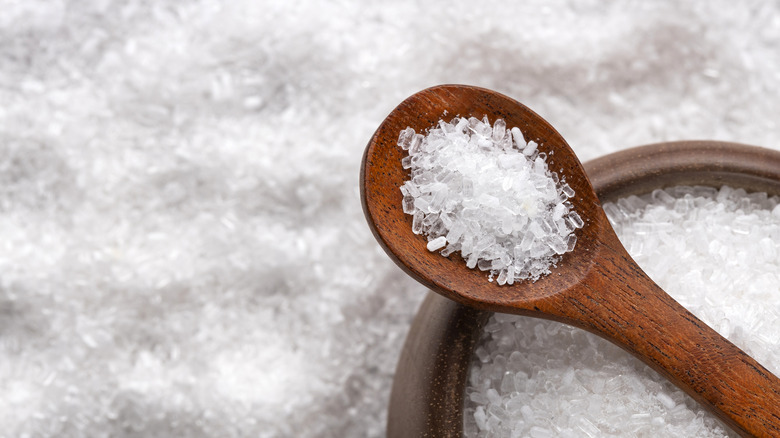The Fabric Softener Alternative That Leaves Your Bed Sheets Incredibly Comfy
At the end of a long day, you deserve to jump into a bed dressed with the silkiest sheets around — so it's extra disappointing when you collapse onto linens that are more scratchy than soft. This can happen for a plethora of different reasons. One is the type of weave — after all, not all cotton sheets are made equal. Percale, linen, and polyester blends tend to feel more crisp and stiff than softer materials, like jersey or sateen. And if the sheets aren't high-quality, any blend can feel rougher than you might like.
It can also be laundry-related. There are tons of mistakes to avoid when washing your sheets. Detergent buildup, excess fabric softener, mineral buildup from hard water, or high temperatures for drying can all warp the fibers of your sheet, causing them to lose their natural softness.
But while there are several factors that can contribute to scratchy sheets, there's thankfully one simple and affordable solution that can help soften them. If you soak your sheets in Epson salts, the salt can break down scratchy fibers, giving you the comfy, cozy sheets you deserve.
How to use Epsom salts to soften sheets
If you want to soften your sheets with Epsom salts, fill a large container, like a basin or your bathtub, with cold water and about one-quarter cup of Epsom salts. Stir the salts into the water for a couple of minutes, and then place your sheets inside the container to soak. Make sure they're fully submerged and let them soak overnight. This will give the salts time to loosen the fibers, counteracting any hard water buildup and giving them a softer, gentler feel. After the soak, you can wash and dry your sheets as usual, but remember that high drying temperatures or excess detergent can contribute to more scratchiness. So, you might try using a minimal amount of detergent, lowering the drying temperature, or hanging them to dry.
Keep in mind that excess fabric softener can also contribute to the roughness, in part because many people are unsure of the correct amount of fabric softener to actually use per load. Overuse can leave residue on natural fibers, rendering them less soft and breathable. It's also not great for people with sensitive skin, as some of the ingredients can exacerbate conditions like eczema or asthma. Plus, there are lots of smart ways to use Epsom salts around the house, making them more practical to have on hand than fabric softener.

